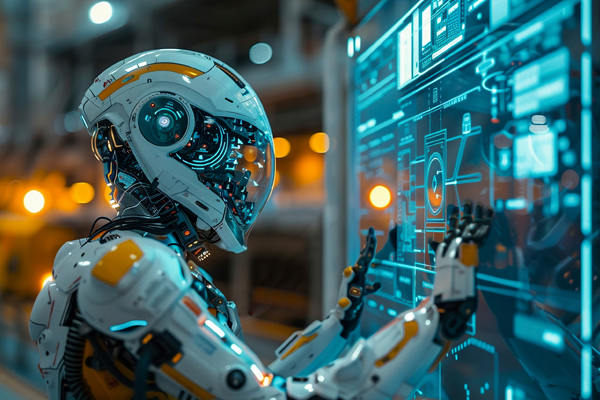According to Statista, the value of the AI market is expected to increase from $241.8 billion in 2023 to nearly $740 billion by 2030, with an annual growth rate of 17.3%. Artificial intelligence is expanding across various sectors, including healthcare, education, finance, media, and marketing. More and more companies worldwide are adopting this technology, driving an unprecedented digital transformation. But how can this expansion directly impact your company?
The AI Revolution in the Healthcare Sector
The healthcare sector has been one of the biggest beneficiaries of AI adoption. Technologies are revolutionizing diagnostics, treatments, and even hospital administration. In Brazil, companies like Dr. TIS are using AI to improve the efficiency of medical consultations and diagnostics.
The platform developed by the company uses advanced algorithms to analyze symptoms reported by patients and suggest possible diagnoses, speeding up the consultation process and reducing medical errors.
Another notable example is the Brazilian startup Laura, which developed an AI robot to monitor patients in real-time. This system can identify signs of clinical deterioration even before symptoms manifest, allowing for early intervention and saving lives. With the market’s growth, more solutions like these are expected to become common, significantly improving the quality of healthcare.
AI adoption in the healthcare sector is also helping to reduce operational costs. Automated processes and clinical decision support systems are decreasing the time needed for diagnosis and treatment, resulting in more efficient use of resources.
With the projected market growth, healthcare companies investing in this technology will be better positioned to face future challenges and stand out in a competitive market.
Education Transformed by Artificial Intelligence
Education is another area undergoing significant transformation thanks to AI. Personalized learning tools are revolutionizing how students interact with educational content. In Brazil, Geekie is a pioneer in this field, using AI to create personalized study plans that cater to each student’s individual needs.
Geekie’s platform analyzes student performance in real-time and adjusts the content according to their difficulties and strengths.
Moreover, AI is being used to automate administrative tasks in educational institutions, freeing up teachers to focus on teaching and supporting students. AI-based systems can manage enrollments, track student progress, and even predict which students may need additional help. This level of personalization and efficiency would be impossible without artificial intelligence.
With the AI market projected to grow significantly, more educational institutions are expected to adopt these technologies to improve the quality of education and increase administrative efficiency. Personalizing learning and automating administrative processes not only enhance the student experience but also help institutions operate more effectively and economically.
Innovation in the Financial Sector Through AI
The financial sector has been a pioneer in adopting AI technologies. Banks and financial institutions are using AI for a wide range of applications, from risk analysis to fraud detection. In Brazil, Banco Bradesco implemented BIA, a virtual assistant that uses artificial intelligence to interact with customers and answer questions about banking services.
This innovation not only improves the customer experience but also reduces the workload of human attendants.
Another important application of AI in the financial sector is in investment management. Platforms like Warren use AI algorithms to analyze the financial market and offer personalized investment recommendations to their users. These platforms can process large volumes of data in real-time, identifying investment opportunities that might be missed by human analysts.
AI is also helping to improve operational efficiency in the financial sector. Automated transaction processing and data analysis systems are reducing the time needed to conduct financial operations and minimizing errors. With the growth of the AI market, more financial institutions are expected to adopt these technologies to stay competitive and provide high-quality services to their customers.
Media and Marketing Driven by AI
The media and marketing industry is being radically transformed by AI. Data analysis tools and machine learning algorithms are enabling media companies to better understand their audiences and create more relevant and engaging content.
In Brazil, Globo uses artificial intelligence to personalize content recommendations for its viewers, increasing audience engagement and satisfaction.
Furthermore, AI is revolutionizing digital advertising. Platforms like Predicta use AI algorithms to analyze consumer behavior and create highly targeted advertising campaigns. This personalization allows companies to reach their target audience with greater precision, increasing campaign effectiveness and return on investment.
Automating marketing processes is also a significant benefit of AI. Marketing automation tools, like RD Station, allow companies to manage marketing campaigns more efficiently, from content creation to performance analysis. With the AI market growing rapidly, companies that adopt these technologies will be better positioned to stand out in an increasingly competitive market.
Adapting Brazilian Companies to AI Growth
Brazilian companies across various sectors are recognizing the importance of investing in AI to stay competitive. Natura, for example, uses AI to optimize its supply chain, improving logistical efficiency and reducing costs. The company developed a system that uses AI algorithms to forecast product demand and adjust production accordingly, preventing waste and ensuring the right products are available at the right time.
Another Brazilian company adopting AI is Magazine Luiza, which uses AI algorithms to improve its customers’ online shopping experience. The company’s AI system analyzes customer shopping behavior and offers personalized recommendations, increasing sales and improving customer satisfaction.
Embraer is also exploring AI’s potential to optimize its aircraft manufacturing and maintenance processes. The company is developing predictive maintenance systems that use AI to monitor aircraft performance in real-time and predict when maintenance is needed. This not only increases safety but also reduces operational costs.
The growth of the AI market presents a significant opportunity for Brazilian companies willing to invest in this technology. By adopting AI, these companies can improve operational efficiency, offer better products and services, and stand out in a highly competitive global market.
The Growth Opportunity
The AI market will grow by $740 billion by 2030, and companies that invest in this technology now will be better positioned to reap the benefits of this growth. AI adoption can transform sectors such as healthcare, education, finance, media, and marketing, providing significant improvements in operational efficiency and customer satisfaction.
For entrepreneurs, company directors, and managers, the time to act is now. Investing in artificial intelligence is no longer an option but a necessity to stay competitive in the global market. Brazilian companies already adopting AI are reaping the rewards of this decision, and the trend is that more companies will follow this path.
By adopting AI, your company can not only improve efficiency and reduce costs but also create new growth and innovation opportunities. With the projected growth of the AI market, companies that adapt quickly will be at the forefront of this technological revolution.
In a world where AI is becoming increasingly prevalent, being prepared for this change is crucial. Take advantage of this opportunity to transform your business and position yourself as a leader in your sector. The future is promising for those willing to invest in artificial intelligence and harness its full potential.
Take advantage and learn about all Nexloo solutions.




